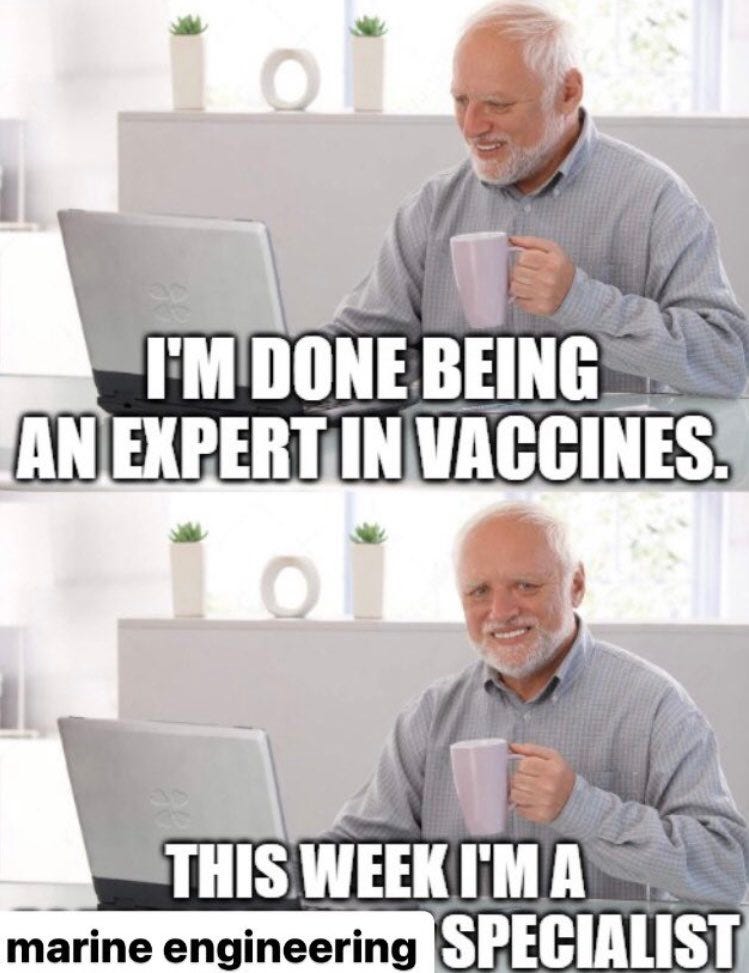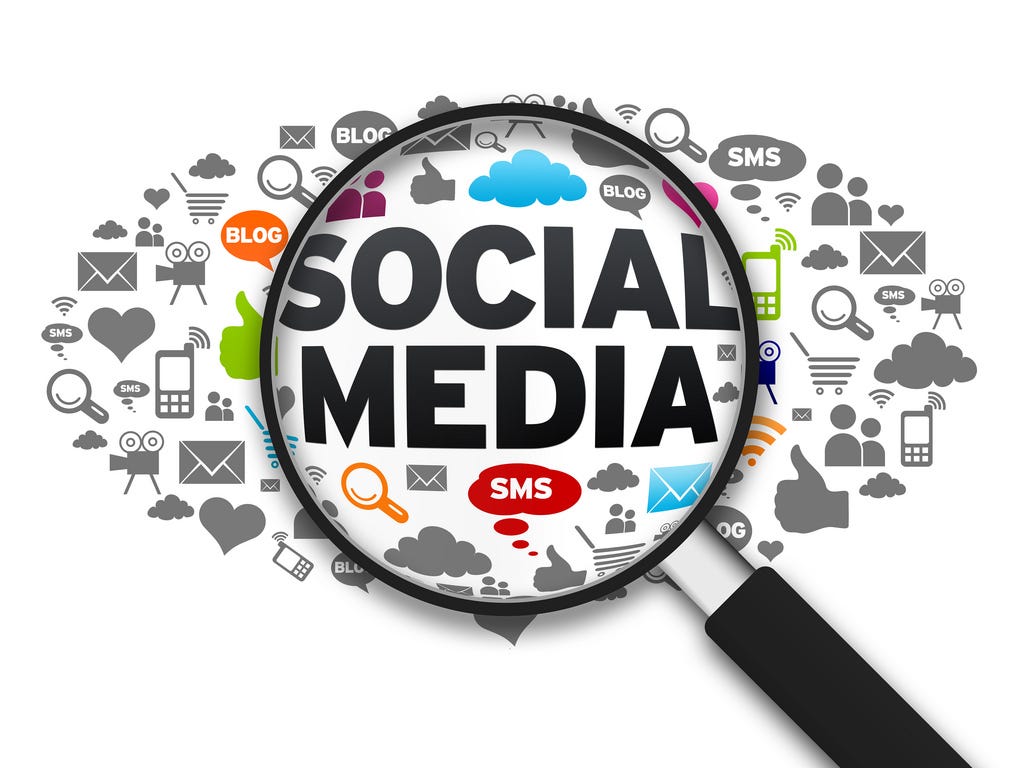It is better to keep your mouth shut and let people think you are a fool, than to open your mouth and erase all doubt.
- Mark Twain
Lots of opinions out there
One of the biggest problems with the proliferation of online platforms is that everyone feels as though they must share their views.
There’s a great meme that goes around every time a new issue surfaces, that looks something like this:
There are loads of memes like this, and in their humour they highlight a great point: if you spend time on Facebook, Instagram, Twitter, or now Threads, you’re going to come across a lot of nonsense opinions from armchair commentators who believe they know what they’re talking about.
Have something to say about Palestinian evictions in Jerusalem? Do tell. Got an opinion about the polls coming out of Maricopa County? Let’s hear it. Want to share your thoughts about the viability of a carbon-fibre shell on a deep-sea submersible? I’m sure you’ve thought a lot about this one. Well versed in Russian mercenary coup-plotting tactics? I can’t wait to hear your theories. Please, share what you think about the ex-president’s legal-team’s proposition about the viability of a constitutional challenge to the application of executive privilege in the context of solicitor-client privilege with the crime-fraud exemption.
Maybe this is a bit harsh as I am probably someone who has engaged in this too (in fact, I started a Substack to share my opinions…), but it poses a difficult problem. Not only does it flood the internet with a lot of content, but it also garbles the discourse and makes it difficult to parse through what it, or is not, true and/or reasonable.
Must opine
It’s not novel to write about the opinions of the mob. But I’m honestly less concerned that people platform their opinions at every chance. I am more concerned when people are forced to share their opinions, or feel as though they are forced to share, given where the zeitgeist has led us.
With a little bit of online literacy, you can learn how to filter what you’re reading as you doom-scroll through Twitter at 2am. It is another thing altogether to be expected to share your opinion. I believe it is becoming harder and harder for people to say that they just don’t know.
Armchair advocacy
As an “elder” millennial, I began to think how far back I can remember this happening. Sure, I remember when I first got my Facebook account in 2005, but the platform back then was far different than it is today. For whatever reason, the “Kony” episode really stands out however as the first time when I felt that people were being forced to weigh in on something that they didn’t really understand.
For those of you who don’t recall, in about 2012 a short documentary called Kony 2012 went viral on Youtube. The director, Jason Russell, who had founded Invisible Children, Inc., had put together a documentary about the Ugandan rebel leader Joseph Kony and his war crimes. The documentary, and the subsequent advocacy work that Russell did was an effort to bring Kony to justice for crimes against children, specifically, using child soldiers in African conflicts.
I need not get into some of the craziness surrounding the Kony craze, but what I recall was that people were becoming ‘advocates’ by posting things like “#Kony2012” on Facebook or Twitter aaaaand that was it. They didn’t know much about the cause, in many cases didn’t look past the (flawed) documentary, and were content being advocates by posting a hashtag online.
It’s not a bad thing to bring better awareness to a human rights abuse abroad, and I suppose something is better than nothing, but I refer to this episode because it feels to me like it was the beginning of people being pressured to weigh in on something that they did not really understand. I likely did the same. My peers and I were in our mid-20s, we saw a complex issue, and we wanted to do something. In hindsight however, the problem was that the internet makes things simple, a little too simple, and that distorts reality and our actions within it.
2023 is not 2012
Fast forward to today, and we are lightyears ahead of where we were in 2012. Information is proliferated faster, we have more platforms available to us, and we are expected to weigh in quicker than before. It is also increasingly complicated to tell the difference between news and opinion online.
It is becoming harder to avoid giving an opinion because whereas before you may have never heard of some issue, today as you scroll through a newsfeed, you may see, for even half a second, a headline that establishes your entire opinion about an issue. Most people don’t read past a headline, or even finish reading all 280 characters of a tweet. If you scroll through a newsfeed and a headline flashes before you that says “Israel attacks civlians in Jenin” (which it did not) or “RFK Jr. says Jews immune from COVID” (also, we are not), then that information likely gets stuck in your subconscious.
That iota of information can shift your perspective instantly, and when the issues comes up in conversation later that day, it is human nature to want to weigh in, rather than saying that you don’t know enough. When two-hours later someone says to you “Wow, did you see the situation in Israel?”, you may be inclined to say “Ya, I heard Israel is attacking civilians in Jenin” rather than saying “I actually don’t know.”
This reminds me of an incident with Alexandra Ocasio Cortez in July 2018, when during her initial campaign for Congress, she was asked “What is your position on Israel?” She responded with some buzzwords about Israel and the Palestinians, used the words “occupation,” “settlements,” “crisis,” and “humanitarian condition.” When the interviewer made it clear that AOC had absolutely no idea what she was talking about, she laughed it off and said, “I am not the expert on geopolitics on this issue.”
Obviously. But she should have started with that statement, not ended it after stringing a random series of thoughts together that angered and confused supporters and non-supporters alike.
I’m by no means a social psychologist, but I imagine human nature plays a big role here, where someone’s ego pushes them to show that they know something, whether it is right or wrong, rather than nothing.
This is also something that comes from having the entirety of human knowledge and experience stored in a small black box in your pocket. It is no longer OK to not know about something, because you can look something up in a minute. And if it is easy to do some quick preliminary research, then surely you must have an opinion about it, or be able to do some analysis about the topic. In fact, now we not only have Wikipedia to give us some information (reliable or not), but you can simply ask ChatGPT to prepare an opinion for you on a topic. This is deeply worrying.
Worries
Why am I so worried about this? I have three kids who will all be highly impressionable at some point. They will no doubt be impacted by peer and social pressures, and regardless of the house they’re raised in, or the values we impart, they will be pressured to think or feel a certain way at some point.
This is nothing new, but what is new is that those opinions are no longer just shared among friends. They are posted online and the internet is forever. For many, myself included, there is a feeling that if you have an opinion, you ought to share it immediately online. We believe that if you can post, you should! But opinions change, and the circumstances in which those opinions are formulated can change quickly too.
It will then no longer be possible to hide from your past beliefs and opinions, and as we see over and over, people are getting fired, cancelled, and utterly torched online because of past opinions they expressed, perhaps even at a time when those experiences were not inflammatory. But, times change.
It is OK to keep your opinions to yourself, or your partner, or even a close group of friends. But there is a difference between sharing a picture of your lunch, and sharing your opinion about the newest affirmative action ruling coming out of the American Supreme Court.
It may seem that in the deluge of online opinions, you are just adding another drop in the bucket, but everything is attributable, and what is online stays online. It can impact our futures, and we must zealously protect our reputations and avatars as well as those of our kids. Allowing them to make a single mistake is no longer something that can simply be brushed under the rug like in the past. People today are much less forgiving.
We must also realize how our voices may be used against our own positions or communities. Expressing a single opinion against Israel, for example, can (and likely will) no doubt be used by our enemies to show that there is hatred of Israel within the Jewish community, and it will be used to try erode the unity we seek.
Vigilance is important, especially when it is so easy to express yourself. All I can add is the same advice I’ll ultimately give my kids: before you post something, take a beat, and remember that every action has consequences. They probably won’t listen, and this advice is not unique, but hopefully if we are repetitive enough, they’ll have a voice in the back of their head urging restraint, which is something we can all use a bit more of these days.








